
S. Antiglio (PHE) : “The challenge: push forward with our development and be ready for the 2030s”
Following a 2022 marked by its acquisition by D’Ieteren Group and uninterrupted growth, the third largest European spare parts distributor is preparing for an unpredictable 2023 buffeted by inflationary forces. Zepros discussed its results and prospects with Stéphane Antiglio, the CEO of PHE, and Jeremy de Brabant, the managing director of its BtoB division.
Is the acquisition of PHE by D’Ieteren Group an industrial project or just a financial investment?
Jérémy de Brabant: It is a financial investment undertaken by D’Ieteren Group, a stock exchange listed, family controlled investment company. D’Ieteren Group invests in many different sectors. Why PHE? The group clearly appreciated our business plan, our company model and our teams. D’Ieteren Group shares and supports our development project. With close historical ties to the auto industry through its activity D’Ieteren Automotive, D’Ieteren Group considers the IAM sector to hold long-term potential. No synergies are planned with any of the group’s other activities, including automotive.
D’Ieteren Group announces 15.4% growth for the first nine months of the year at PHE. Is this in phase with the 2022 landing zone?
Stéphane Antiglio: It’s a trajectory we hope to maintain. These results are supported by our dynamic organic growth and by the integration of recent acquisitions. This development is uniform in all the countries where we are established. Today’s unprecedented mega-inflation has contributed to almost half this performance.
How do you see 2023?
S.A.: For a parts distributor, times are tough. Our costs are significantly up, and some are even rising faster than our selling prices. We are taking steps to maintain our profit levels and to be in a position to reinvest in our development. 2022 was a very challenging year, and 2023 is like to be even more so.
J. de B.: The drop in household purchasing power is sure to have an impact on the ageing of the vehicle fleet and on its mileage. The combination of inflation and lower purchasing power will result in existing models being called into question. We are very watchful of the need to preserve affordable mobility. We think that we will be able to grow our sales in this environment thanks to our positioning as a multi-specialist and our logistical organisation. We are therefore optimistic for PHE’s growth in 2023.
Who pays for this inflationary pressure?
S.A.: Consumers pay for part of it. And like distributors, garages also chip in. Parts suppliers are finding themselves under pressure from vehicle manufacturers, from a decline in OE volumes, from Russia and Ukraine being closed off, from raw material shortages, from rocketing energy prices... and in parallel they need to invest to invent their future. Solving the equation is no easier for our suppliers than it is for us. We understand the need of some firms to raise their prices. But those who push the cursor too far should beware. They are playing a dangerous game, and risk losing their foothold to the benefit of alternative offerings at more acceptable prices.
To what extent are you affected by shortages?
J. de B.: We experienced shortages in mid- 2022 with supplier delivery delays that were five times higher than in 2019, and fell to 2.5 times at the end of the year. The improvement is unmistakeable, but we want to return to pre-pandemic conditions.
S.A.: We are experiencing interruptions, but we endeavour not to pass them on to our clients. In practice, this means that we are carrying unprecedented volumes of inventory, for which we bear the costs. This strategy, which we initiated at the outbreak of Covid in 2020, is supported by our shareholder. We do everything we can to guarantee the availability of products to our clients.
How is PHE doing in its European deployment?
J. de B.: In Spain, we are very pleased with what we have achieved in three years with the teams. With three new acquisitions in 2022, we now have a network of six companies. Our ambition is to build on this and complete the organisation as opportunities arise. Our modus operandi is based on a friendly takeover approach, with, for each acquisition of our partners who are members of AD Parts, the desire to leave the historical leaders (25% of share capital) in place to continue running the operation. We build the future of these companies together, with a genuine plan. In Italy, while arrangements vary, the spirit is the same.
S.A.: In Italy, our twenty or so subsidiary sites and the seven Giadi affiliated independent sites offer comprehensive national coverage. We have a sufficiently tight network because our sites are pivot platforms that deliver to “ricambisti” who in turn supply the garages. We are reinforcing our logistical arsenal with an investment in a new generation warehouse in Padua, which will cover the north east of the country. Our strategy is to remain focussed on the countries in which we are established, while remaining on the lookout for opportunities.
What is your position on connectivity?
J. de B.: Connectivity is a key concern for the entire profession. PHE supports repair professionals and offers them solutions: we have four remote diagnostic devices, as well as a remote assistance service through Grup Eina.
S.A.: Connected vehicles are expensive without bringing real added value to consumers. The technology represents a significant cost to repair professionals who have to acquire the equipment, get trained up, pay to get through the gateways and Passthru systems, but also to benefit from a powerful internet connection. These costs are passed on to motorists in their repair bill.
And on electrification?
J. de B.: Our watchword is to provide our repairers with he means to work on all vehicles, especially if we want to continue building our presence on the fleet market. At PHE, it’s not as if we discovered electrification yesterday! Already in 2013, we started training garages in new powertrains: more than 1,900 Autodistribution clients are already trained in electric vehicles in France. The Institut AD today delivers all the electric licences, including for live-line work.
S.A.: The first to be impacted were the body shops. They already had to become proficient in ADAS, and are now getting training in electric vehicles. They are already seeing electric vehicles arriving in their workshops. In certain very urban zones, mechanical garages are starting to see this type of clientele, but the build-up will be very gradual with a proportion of electric vehicles over 5 years of ages which will still remain low in 2030. But we have to be ready to hit the ground running in the decade from 2030 to 2040.
Lire la version française : S. Antiglio (PHE) : «Poursuivre notre croissance et être prêt à aborder la décennie 2030»








